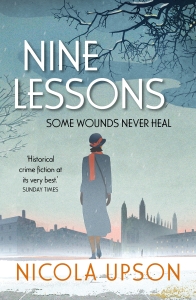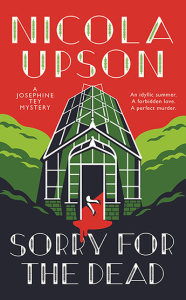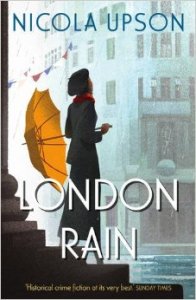Nine Lessons – Nicola Upson
 As a crime fiction author, Nicola Upson is going against the grain of much of the contemporary canon. You won’t find high-testosterone heroes, gory bloodshed and adrenaline-filled action scenes in her novels. Expect instead subtle character development, satisfying whodunnits and absorbing historical details in all of the seven novels she created featuring early-twentieth-century Scottish mystery writer and dramatist Josephine Tey, of which ‘Nine Lessons’ is the latest.
As a crime fiction author, Nicola Upson is going against the grain of much of the contemporary canon. You won’t find high-testosterone heroes, gory bloodshed and adrenaline-filled action scenes in her novels. Expect instead subtle character development, satisfying whodunnits and absorbing historical details in all of the seven novels she created featuring early-twentieth-century Scottish mystery writer and dramatist Josephine Tey, of which ‘Nine Lessons’ is the latest.
Tey was by rights one of the great names in the Golden Age of British crime writing, a wry observer of her period whose novels make fascinating reading, and not just for the crime plots (my favourite is ‘The Daughter of Time’). By ‘borrowing’ her as a main character, Upson is able to make her own portrayal of society, crime and justice in Britain in the inter-war years all the more realistic and telling, a clever combination of the historical and the modern.
Though set in the late 1930s, ‘Nine Lessons’ doesn’t quite follow the model of the classic crime novel however, least of all in its lead detective: far from being a gifted amateur sleuth, the co-protagonist of this and Upson’s previous novels, Metropolitan Police DCI Archie Penrose, is humane, very smart and, though a member of the ‘establishment’, has a sharp eye for its foibles and shortcomings, resulting in a more layered counterpart to investigators à la Hercule Poirot or Lord Peter Wimsey.
And there is Penrose’s close friend Josephine Tey who, in her role as occasional but hawk-eyed investigator, brings a welcome addition of feminine intuition to the stories, crucially in ‘Nine Lessons’, in which one of the two plot strands concerns a series of rapes on young Cambridge women.
As a nod to the classical tradition, ‘Nine Lessons’ does explore the rarefied, rather exclusive (certainly at the time) world of Cambridge University and its dons and students, including iconic figures such as one-time Dean of King’s College and ghost-story writer M.R. James. The novel opens with the discovery of a savagely murdered church organist in London, struck on the head and left to die half-buried inside a desecrated tomb in St John-at-Hampstead cemetery, with a cryptic hand-written message and the half-torn picture of a Jacobean manor house in his pockets.
At a loss for an explanation of why the solitary, seemingly innocuous middle-aged man should be killed so horribly, Penrose travels to Cambridge, having identified the manor house as Angerhale Priory in Cambridgeshire, to see if any explanation could be found there, and in the organist’s student years at King’s College just before the Great War. There is a connection indeed, since the organist was a member of King’s College’s renowned choir as was Robert Moorcroft, Angerhale Priory’s wealthy, influential owner.
The latter is irritatingly condescending towards Penrose and clearly has something to hide, or something he’s worried about and won’t share with the Scotland Yard detective. As Penrose and his resourceful DS Fallowfield dig deeper into the King’s College choir connection, they unearth two more suspicious deaths among the former choristers, the second of them occurring the day after Penrose’s visit to Angerhale Priory.
Upson is especially skilful at setting off the horrific murder spree against the rarefied atmosphere of academia and religious fervour Penrose encounters while investigating at King’s College. Almost as if she was daring the readers to refuse to acknowledge the possibility of a link between worlds that lie seemingly at the opposite end of the galaxy of human endeavour.
Yet, hatred, revenge and murder do colour the fabric of the life of the privileged, just as they do that of the more down-to-earth girls who are victimised by the serial rapist on the loose in Cambridge. Josephine Tey, living in Cambridge at the time, gets a whiff of the latter as she succours a young nurse and neighbour, the victim of the latest attack. And, inquisitive soul that she is, she starts to take an active interest in the matter.
Both plot strands, the choristers’ murders and the Cambridge rapist’s criminal attacks, would be worthy of a novel in themselves. Upson weaves them together seamlessly and skilfully, though I did occasionally feel that, needing to fit both strands in one novel, she lost the opportunity of giving more depth to some of her interesting secondary characters and their back-stories (Robert Moorcroft’s wife’s, for example).
But the plot does come together satisfactorily, thanks also to a third strand which opens a startling window onto Archie Penrose’s past – a daughter he didn’t know he had, no less, who now lives in Cambridge and becomes acquainted with Josephine Tey.
‘Nine Lessons’ is indeed filled with plenty of unexpected twists, and its leading characters, Archie Penrose and Josephine Tey, are cleverly portrayed. Upson is equally adept at building into their personalities some elements which are a reflection of society in their times, and others which are more ‘contemporary’, or perhaps simply more enduring. Penrose is sharply aware of social and political proprieties – he himself admits he wouldn’t have risen so high in the Metropolitan Police if he wasn’t – but he intensely dislikes the notion that birth privilege is all-absolving, as a man like Moorcroft clearly believes. Though not exactly underprivileged himself, Penrose had to work hard to build a successful career, and so did Josephine Tey who, as a woman, had to fight even harder. And her willpower and investigative nose will compel her to help out Penrose in his Cambridge investigation, and to keep digging for an answer to the Cambridge rapist case.
Upson’s writing is smooth, sharp and acute, on par with her plotting. Again, a clever combination of the poise you’d expect in a classic crime writer, with the kind of insights into human behaviour which make her novels so attractive to contemporary readers. Despite having something of a niche appeal, ‘Nine Lessons’ is a worthy addition to Nicola Upson’s Josephine Tey series, and a promise of further entertaining novels from her in the future.





